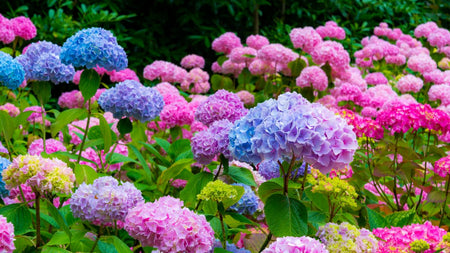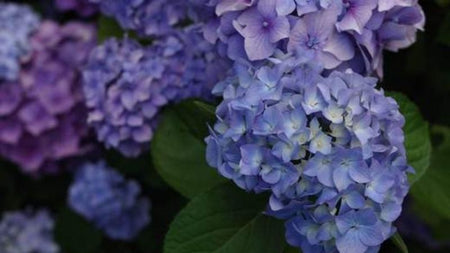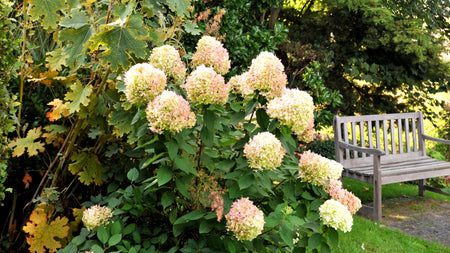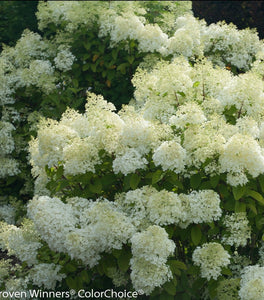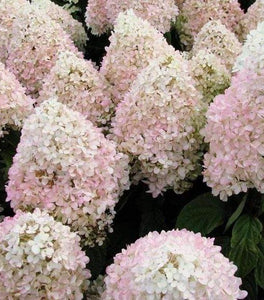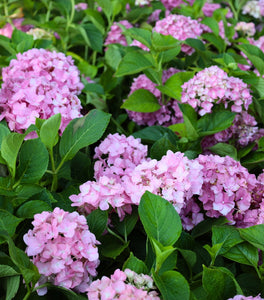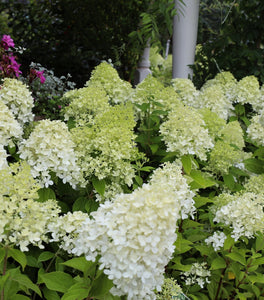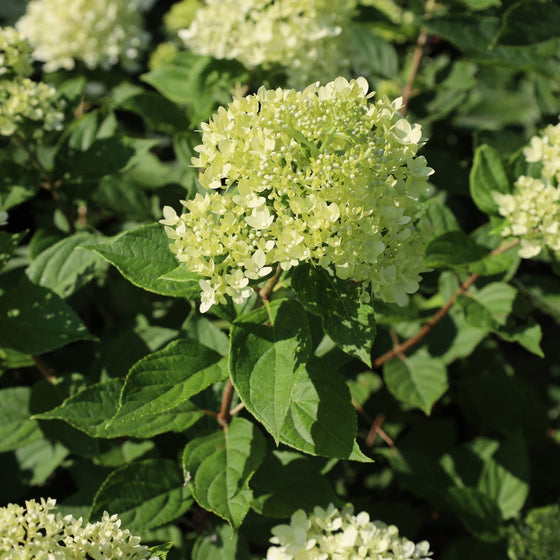
Images Depict Mature Plants
Little Lime Hydrangea – Compact Dwarf Panicle Hydrangea with Green-to-Pink Blooms
The perfect hydrangea for small spaces with big color.
The Little Lime® Hydrangea (Hydrangea paniculata ‘Jane’) is a compact version of the beloved Limelight Hydrangea, delivering the same fresh lime-green blooms on a smaller, neater shrub. Growing just 3–5 feet tall and wide, it fits beautifully in foundation plantings, borders, and decorative pots without sacrificing the show-stopping blooms hydrangeas are famous for. Each cone-shaped flower cluster emerges lime green in summer and matures to a soft pink blush as temperatures cool.
Compact size, massive impact.
Little Lime’s dense, upright habit and strong stems make it a standout in the landscape. Unlike taller hydrangeas that can flop after heavy rain, Little Lime holds its blooms upright and resists breakage. This variety thrives in full sun to partial shade and produces a steady stream of long-lasting blooms that can be enjoyed fresh or dried for arrangements.
Hardy, reliable, and low maintenance.
Native to Asia and bred for modern landscapes, Little Lime is cold-hardy from Zones 3 to 8, heat-tolerant, and adaptable to most well-drained soils. Once established, it’s remarkably easy to care for — requiring only occasional watering and light pruning in early spring to promote new growth. Each season, the plant flushes with fresh blooms that change from lime to white to blush pink, offering four-season interest.
A dwarf hydrangea with year-round appeal.
In autumn, Little Lime’s flowers fade to rosy-mauve and its sturdy stems add texture to the winter garden. Perfect for urban yards or cozy cottages, this compact hydrangea delivers classic Limelight beauty in half the size — a true winner for gardeners who want low maintenance and high reward.
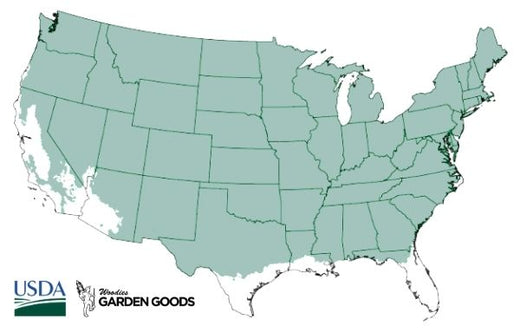
| Hardiness Zone: | 3-8 |
|---|---|
| Mature Height: | 3 to 5 Feet |
| Mature Width: | 3 to 5 Feet |
| Classification: | Broad-leaved deciduous shrub, summer flowering |
| Sunlight: | Full sun to part sun |
| Habit: | Upright, densely branched |
| Flower Color: | Greenish white flowers in summer turning light pink to burgundy in fall |
| Foliage: | Dark green |
| Pruning Season: | Early spring, promotes increased branching and more flowers |
| Soil Condition: | Any well-drained soil |
| Water Requirements: | Water well until established |
| Uses: | Extremely attractive when used as a focal point in the mixed border, mass planting, or a specimen planting |
How to Care for Little Lime® Hydrangea
Be sure to read our planting instructions to ensure a healthy and happy Little Lime Hydrangea plant for years to come!
How do I plant a Little Lime Hydrangea?
Choose a spot with full sun to partial shade and well-drained, fertile soil. Dig a hole twice as wide as the root ball but no deeper. Position the plant so the top of the root ball is level with the ground, backfill with soil, and water deeply. Apply a 2-3 inch layer of mulch around the base to retain moisture and regulate temperature, keeping mulch a few inches away from the stems.
How often should I water Little Lime Hydrangea?
Water deeply once or twice a week, especially during hot or dry weather. Hydrangeas prefer evenly moist soil but should not sit in standing water. Consistent watering produces larger, longer-lasting blooms and stronger stems. Once established, Little Lime becomes fairly drought-tolerant and needs less frequent watering outside of prolonged dry periods
When and how should I fertilize Little Lime Hydrangea?
Fertilize in early spring with a slow-release shrub fertilizer (10-10-10 or similar). A light feeding each spring is enough to encourage vigorous growth and strong blooms. Avoid excess nitrogen, which produces leafy growth at the expense of flowers. Healthy soil and annual mulching often provide adequate nutrients without additional feeding.

When should I prune Little Lime Hydrangea?
Prune in late winter or early spring before new growth emerges. Cut stems back to about 18–24 inches above the ground to encourage strong new shoots and larger blooms. Because Little Lime blooms on new wood, annual pruning won’t reduce flowers. Remove spent blooms in summer for a neater appearance.














